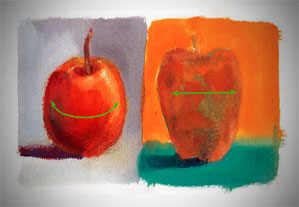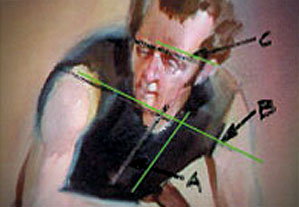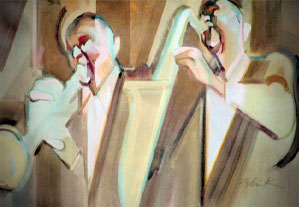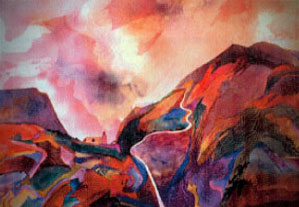Cheap Joe’s Art Stuff Art Blog
Tips, Tricks, Thoughts, and inspiration from across the art spectrum.

Artist Tip 20: Round and Flat
We wanted to make everything look round when we were first learning to paint; it was one of our big tricks. We'd been taught how to make things look three-dimensional...
Artist Tip 20: Round and Flat
We wanted to make everything look round when we were first learning to paint; it was one of our big tricks. We'd been taught how to make things look three-dimensional...

Artist Tip 21: The Right Gesture
Drawing and painting people should be easy. After all, there's nothing we're more familiar with than the human form. If we have no trouble drawing and painting flowers and trees...
Artist Tip 21: The Right Gesture
Drawing and painting people should be easy. After all, there's nothing we're more familiar with than the human form. If we have no trouble drawing and painting flowers and trees...

Artist Tip 22: Getting Into Shape
We don't see shapes; we see things -boats and barns and someone that looks amazingly like Uncle Mert. We don't think about any of these things as shapes-rectangles or circles...
Artist Tip 22: Getting Into Shape
We don't see shapes; we see things -boats and barns and someone that looks amazingly like Uncle Mert. We don't think about any of these things as shapes-rectangles or circles...

Artist Tip 23: Using Watercolor Canvas
One of the first things I noticed in painting on Fredrix Watercolor Canvas was that I could achieve many different kinds of edges than on paper.
Artist Tip 23: Using Watercolor Canvas
One of the first things I noticed in painting on Fredrix Watercolor Canvas was that I could achieve many different kinds of edges than on paper.

Artist Tip 24: Rusticating in Paint
Nothing seems to attract a watercolorist more than a rust bucket, a farm building in disrepair or the old rocking chair on its front porch.Where does this interest in the...
Artist Tip 24: Rusticating in Paint
Nothing seems to attract a watercolorist more than a rust bucket, a farm building in disrepair or the old rocking chair on its front porch.Where does this interest in the...

Artist Tip 25: Cezanne: Watercolor and Form
You may have wondered. His watercolors look a little thin; his figure drawing seems a bit shaky, and the perspective in his paintings often seems slightly off. In fact, there...
Artist Tip 25: Cezanne: Watercolor and Form
You may have wondered. His watercolors look a little thin; his figure drawing seems a bit shaky, and the perspective in his paintings often seems slightly off. In fact, there...

Artist Tip 26: Making Your Mark
That personal, calligraphic mark that distinguishes one artist's work from another — seems to be disappearing. From the evidence of current gallery shows and exhibitions, more and more painters are...
Artist Tip 26: Making Your Mark
That personal, calligraphic mark that distinguishes one artist's work from another — seems to be disappearing. From the evidence of current gallery shows and exhibitions, more and more painters are...

Artist Tip 27: Aerial Perspective: When to Use ...
The effects of aerial perspective, simply stated, are that distant objects appear cooler, flatter, grayer, and smoother. It is a visual truth and a conceptual tool that is available to...
Artist Tip 27: Aerial Perspective: When to Use ...
The effects of aerial perspective, simply stated, are that distant objects appear cooler, flatter, grayer, and smoother. It is a visual truth and a conceptual tool that is available to...

Artist Tip 28: Painting A Series
“T’aint Whatcha Do; It’s the Way Howcha Do It” is an aphorism from an old jazz tune that applies as well to painting as it does to playing jazz. In...
Artist Tip 28: Painting A Series
“T’aint Whatcha Do; It’s the Way Howcha Do It” is an aphorism from an old jazz tune that applies as well to painting as it does to playing jazz. In...

Artist Tip 29: Exploring Opaque Watermedia
Because it is insoluble when dry, acrylic was used as a transparent underpainting to achieve a radiant, rich color. Casein was applied in translucent and opaque layers over the acrylic.
Artist Tip 29: Exploring Opaque Watermedia
Because it is insoluble when dry, acrylic was used as a transparent underpainting to achieve a radiant, rich color. Casein was applied in translucent and opaque layers over the acrylic.

Artist Tip 30: Finding A Direction
An artist does not compose his painting by filling it with things; boats, barns, trees, and mountains. He composes it by designing and arranging on his paper areas of color,...
Artist Tip 30: Finding A Direction
An artist does not compose his painting by filling it with things; boats, barns, trees, and mountains. He composes it by designing and arranging on his paper areas of color,...

Artist Tip 1: Understanding How Reflected Light...
If in order to create three-dimensionality, you paint the shaded side of an object dark, cool, and neutral and you paint the illuminated side light, warm, and bright, you'll produce...
Artist Tip 1: Understanding How Reflected Light...
If in order to create three-dimensionality, you paint the shaded side of an object dark, cool, and neutral and you paint the illuminated side light, warm, and bright, you'll produce...






